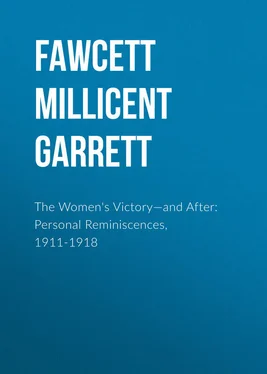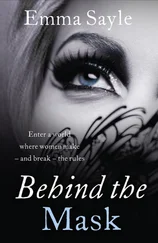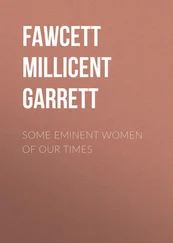Millicent Fawcett - The Women's Victory—and After - Personal Reminiscences, 1911-1918
Здесь есть возможность читать онлайн «Millicent Fawcett - The Women's Victory—and After - Personal Reminiscences, 1911-1918» — ознакомительный отрывок электронной книги совершенно бесплатно, а после прочтения отрывка купить полную версию. В некоторых случаях можно слушать аудио, скачать через торрент в формате fb2 и присутствует краткое содержание. Издательство: Иностранный паблик, Жанр: foreign_antique, foreign_prose, на английском языке. Описание произведения, (предисловие) а так же отзывы посетителей доступны на портале библиотеки ЛибКат.
- Название:The Women's Victory—and After: Personal Reminiscences, 1911-1918
- Автор:
- Издательство:Иностранный паблик
- Жанр:
- Год:неизвестен
- ISBN:нет данных
- Рейтинг книги:4 / 5. Голосов: 1
-
Избранное:Добавить в избранное
- Отзывы:
-
Ваша оценка:
- 80
- 1
- 2
- 3
- 4
- 5
The Women's Victory—and After: Personal Reminiscences, 1911-1918: краткое содержание, описание и аннотация
Предлагаем к чтению аннотацию, описание, краткое содержание или предисловие (зависит от того, что написал сам автор книги «The Women's Victory—and After: Personal Reminiscences, 1911-1918»). Если вы не нашли необходимую информацию о книге — напишите в комментариях, мы постараемся отыскать её.
The Women's Victory—and After: Personal Reminiscences, 1911-1918 — читать онлайн ознакомительный отрывок
Ниже представлен текст книги, разбитый по страницам. Система сохранения места последней прочитанной страницы, позволяет с удобством читать онлайн бесплатно книгу «The Women's Victory—and After: Personal Reminiscences, 1911-1918», без необходимости каждый раз заново искать на чём Вы остановились. Поставьте закладку, и сможете в любой момент перейти на страницу, на которой закончили чтение.
Интервал:
Закладка:
The Session of 1912 dragged its interminable length along. It lasted for thirteen months, from January, 1912, to January, 1913, both inclusive. The Government were slow in producing their Reform Bill. In May, however, it was brought forward, and it did not come up for Second Reading until July 12th, 1912. In the Second Reading debate Mr. Asquith, Prime Minister and Leader of the House, expressed himself as follows:
"This Bill does not propose to confer the franchise on women; whatever extensions of the franchise it makes are to male persons only. Speaking for myself, I cannot help remembering that the House at an earlier stage of the Session rejected with, I think, sufficient emphasis the proposal to confer the franchise on women; and, so far as I am concerned, I dismiss at this moment as altogether improbable the hypothesis that the House of Commons is likely to stultify itself by reversing in the same Session the considered judgment at which it has arrived."
That is to say, the rejection of the Conciliation Bill by a majority of 14 in the previous March was to be taken as "the considered judgment of the House of Commons," whereas its passage in May, 1911, by a majority of 167 counted for nothing at all. What the passage just quoted did stand for was the continued and bitter hostility of the Prime Minister to women's suffrage in any form, and as a renewal of his S.O.S. call to his followers to come to his deliverance. The fortunes of all the little politicians "in the make" are absolutely in the hands of the Prime Minister – more so at that moment than perhaps at any other period of our history. To please the Prime Minister and serve his purposes indicated the road which led to success and preferment, and he made it absolutely plain what was the best possible way to please him in this matter of women's enfranchisement.
This was truly a time when we had "to go on dancing when the fiddle stopped," and we did not decline the task. We held two immense meetings in the Albert Hall, the combined collections at which totalled nearly £13,000, and also organized an even more than usually vigorous campaign throughout the country in support of the inclusion of women in the Government Reform Bill; there were twenty-one by-elections during the year, in all of which the N.U.W.S.S. took an active part, making suffrage a very live issue in the country, and we also lost no opportunity of raising the question in the House on other Bills which came before it.
But the change from a majority of 167 in 1911 to a minority of 14 in 1912 gave a fatal shock to what had hitherto been our election policy – namely, the support at all contested elections of the candidate (irrespective of party) whom we deemed from his answers to our questions, his personal record, and other indications, to be "the best friend of women's suffrage." When the Conciliation Bill was defeated in March, 1912, 42 of these "best friends" had voted against the Bill, and 91 had abstained from supporting it. To lean on such "friends" as these was to lean on a broken reed. We did not abandon the essential principle of our election policy, but we gave a new and improved interpretation of the meaning to be attributed to the words "best friend"; and as a result of a special council held for the purpose in May, 1912, it was decided that a friend of suffrage who had the support of his party upon our question was a better friend than one who belonged to a party which was either hostile or neutral. The immense powers of party in our politics made it practically certain that this was the only safe line to take. There were, it is true, a handful of men, in both the Liberal and Conservative ranks, who had shown themselves such strong and convinced suffragists as to be capable of disregarding the party whip when it was used against us. These we defined as "tried friends" – tried not only on the platform, but in the fiery ordeal of the House of Commons, and these we excepted from the new definition we had agreed to make of the words "the best friend of women's suffrage."
CHAPTER III
THE ELECTION FIGHTING FUND
"My centre is giving way, my right wing is falling back. The situation is excellent. I am attacking."
– Marshal Foch to G.H.Q.The change of policy indicated at the end of the last chapter was adopted after full deliberation and discussion at a council meeting at which our 411 societies were represented, and at which, as was to be expected, there was an important minority who objected to it. For at this council we resolved on a change of rules. The general objects of the N.U.W.S.S. in by-elections were defined as follows:
1. To shorten the term of office of the Cabinet as at present constituted, especially by opposing antisuffrage Ministers.
2. To strengthen any party in the House of Commons which adopts women's suffrage as part of its official programme.
At by-elections we decided that the N.U. should support those candidates whose return would best promote the foregoing objects, provided that:
( a ) No Government candidate should be supported.
( b ) No candidate shall be supported who does not answer all the National Union questions in the affirmative.
Another clause provided for the exemption of "tried friends" from these regulations. It would, of course, have been an absurdity for suffragists to oppose such men as the late Mr. Walter McLaren or Lord Robert Cecil, who had shown through the stress and strain of many years of parliamentary life that they were prepared to act independently of party in cases where electoral justice to women was involved.
But our change of policy was in effect a declaration of war against the official Liberal Party and of support of the Labour Party, which was the only party which had made women's suffrage part of its programme.
This not unnaturally laid us open to the charge of having abandoned our non-party attitude; but I thought at the time, and I think still, that it was the only possible attitude for a truly non-party association such as ours to adopt. We were making no break with our non-party professions so long as we were prepared to give our whole-hearted support to any party which made the enfranchisement of women part of its programme. We found analogies in the attitude of other non-party organizations, and also in what was happening in the suffrage work in Sweden. In our own country we were so far fortunate that none of the political parties had officially identified itself with opposition to suffrage. Men of unrivalled distinction in the Conservative Party for many years past had supported women's suffrage; the names of Lord Beaconsfield, Lord Salisbury (the great Prime Minister), Mr. Arthur Balfour, Lord John Manners, Lord Robert Cecil, need only be mentioned to show that it was an absolute impossibility for the Conservative Party, as a party, to oppose women's suffrage. The same could be said for the Liberals, past and present: The Hon. Charles Villiers, Mr. J. S. Mill, Sir H. Campbell-Bannerman, Sir Edward Grey, Mr. Lloyd George, Mr. Acland, and Sir John Simon, held the antisuffragists in their own party in check; moreover, the rank and file of Liberals were largely in our favour, and all the Liberal catchwords could be cited ad nauseam in our support. There could therefore be absolutely no question of opposition to women's franchise becoming an item in the Liberal programme.
In Sweden, however, the Conservative Party had definitely identified itself with antisuffragism; and the Swedish Suffrage Society, non-party like our own, had been obliged by force of circumstances to put itself into opposition to the party in their own country which definitely opposed the one object for which their society existed.
We no doubt occupied an analogous position with regard to our own political situation; but we had a very important advantage in the existence of one party, the Labour Party, which had officially accepted women's suffrage, and had shown the sincerity of its support by being willing to record its votes in the House in favour of a limited form of enfranchisement for women, although its own inclinations, and probably also its party interests, were in favour of a much more extended measure. The Swedish suffragists opposed the one party which had made hostility to their enfranchisement part of its programme; the N.U.W.S.S. supported the one party which had taken the opposite course by definitely adopting women's suffrage as part of its programme. I maintain that by so doing neither the Swedish nor the British suffrage societies forfeited their claim to describe themselves as "non-party." We welcomed members of all parties into our ranks, and were prepared to give impartial support to any party which made our object its own.
Читать дальшеИнтервал:
Закладка:
Похожие книги на «The Women's Victory—and After: Personal Reminiscences, 1911-1918»
Представляем Вашему вниманию похожие книги на «The Women's Victory—and After: Personal Reminiscences, 1911-1918» списком для выбора. Мы отобрали схожую по названию и смыслу литературу в надежде предоставить читателям больше вариантов отыскать новые, интересные, ещё непрочитанные произведения.
Обсуждение, отзывы о книге «The Women's Victory—and After: Personal Reminiscences, 1911-1918» и просто собственные мнения читателей. Оставьте ваши комментарии, напишите, что Вы думаете о произведении, его смысле или главных героях. Укажите что конкретно понравилось, а что нет, и почему Вы так считаете.












